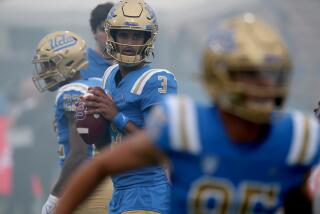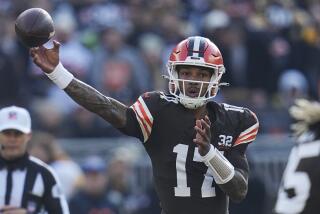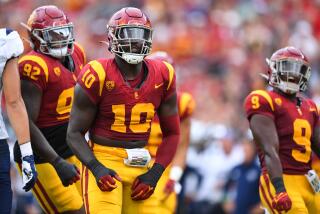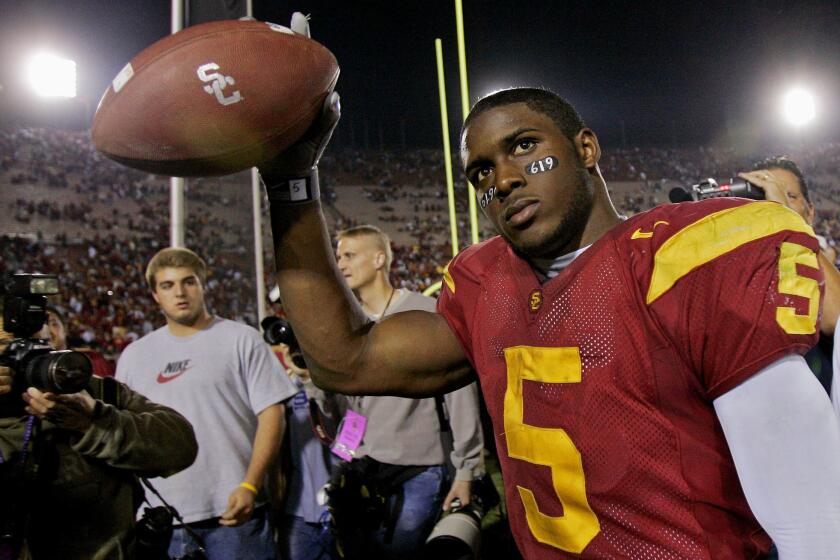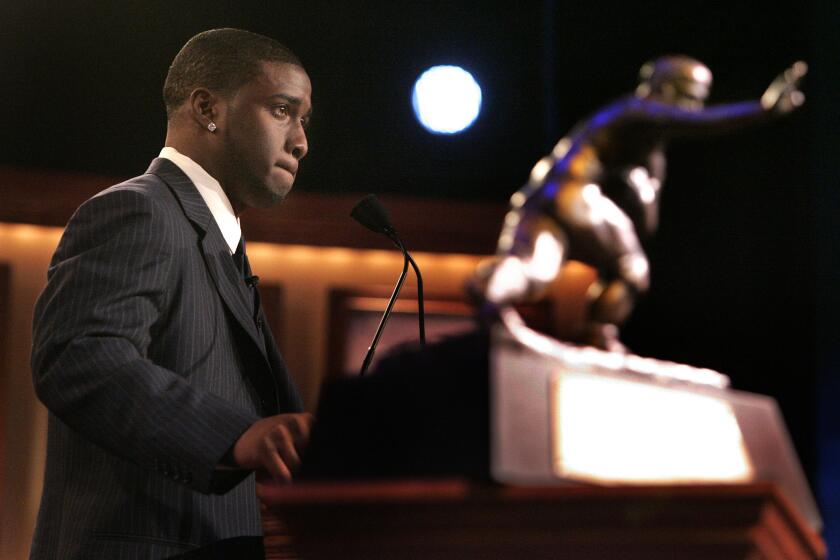What kept Andrew Luck down on the Farm?
Life could take a left turn on Andrew Luck.
The big quarterback from Stanford knows that. He senses the potential for calamity and will address the subject just as soon as he finishes another bite of his sandwich.
“All actions have consequences,” he says.
The football world did a double take last winter when Luck passed up the NFL draft — and millions of dollars — to spend one more season in college.
His unexpected return puts Stanford in the middle of the national championship hunt and makes him an early Heisman Trophy favorite. But the risks are substantial.
Eating lunch at an outdoor table, seeming untroubled on a summer day, Luck ticks off a list of things that could go horribly wrong.
An injury could take him down. His inexperienced offensive line could struggle and turn the coming season into misery. His draft stock could drop for any number of reasons.
“I understand that things change,” he says. “It will be my fault … I won’t have anybody to blame.”
Which raises the obvious question: Why come back?
‘He knows what to do’
The Carolina Panthers held the top pick in the draft this year and had shown a good deal of interest in Luck. It made sense.
Stanford finished last season at 12-1, among the best teams in the nation — right up there with Auburn and Oregon — and the quarterback deserved much of the credit.
Luck completed 70% of his passes for 3,338 yards and 32 touchdowns with only eight interceptions. He had the size at 6 feet 4, the mobility and the arm strength of a pro. He also displayed field savvy that terrified opponents.
“Like you’ve got your pants down on defense,” Oregon State Coach Mike Riley says. “He looks out there, sees what’s going on and always knows what to do with the football.”
The game flows in Luck’s blood. His father, Oliver, was a quarterback for the Houston Oilers in the mid-1980s and served as an NFL executive before taking over as athletic director at West Virginia.
David Shaw, the offensive coordinator at Stanford when Luck was a freshman, recalls watching him run the scout team and knowing the Cardinal had something “phenomenal.”
Shaw is now the head coach and he knows his job is a lot easier with a quarterback who wants every center exchange to be perfect and makes a point of chatting with a different player on the roster every day.
“He’s got to count on these guys, so he wants to know what makes them tick,” his coach says. “He wants to know their personalities, how to talk to them.”
Ask Luck about his leadership abilities and the redshirt junior shrugs. To him, it seems like second nature.
“Any good quarterback does it,” he says.
Risk and reward
After Stanford dismantled Virginia Tech by four touchdowns in the Orange Bowl, word spread that Luck might skip the draft.
Riley recalls having a conversation with Indianapolis Colts President Bill Polian, asking him: “Has there ever been a guy who turned down the No. 1 pick?”
“Yeah,” Polian replied. “Our guy.”
An extra year at Tennessee did nothing to hurt Peyton Manning, but others have paid the price for staying in school.
USC’s Matt Leinart slipped from a potential top pick in 2005 — no one knew he needed elbow surgery — to 10th the following year. Jake Locker struggled as a senior last year at Washington, ranking eighth in the Pacific 10 Conference with a shaky 55% completion rate.
Luck knew the history, knew that he was taking a chance. But that was only one of the items on his list of pros and cons as he pondered the future.
Stanford had enough returning talent to be a preseason top-10 team. Luck liked the idea of taking another shot at a championship or two and finishing up with the guys in his recruiting class.
Much has been made of his desire to complete a degree in architectural design, Shaw saying: “If he never played another snap of football in his life, he’d do very well.”
When Luck hears that, he winces.
“I love football,” he says. “I’ll say that I like football a lot more than I like school.”
If anything, his decision was predicated on a simpler notion that had lingered in the back of his mind since he arrived at Stanford.
“I always thought I wanted to do four years of college,” he says. “That’s sort of the norm.”
The explanation comes with no overt passion or emotion, as if it were merely a gut feeling. Staying in school, he explains, “was pretty evident from the get-go.”
What money can’t buy
The university announced his decision by way of a two-sentence release in January, informing reporters there would be no news conference, no further comments from Luck.
“I didn’t think it was that big of a deal,” he says.
That was a rare example of his instincts failing him. Luck acknowledges a history of feeling uncomfortable with the media and what he calls “all that fanfare and hoopla” swirling around him.
“I used to get flustered by it,” he says. “I’ve learned to deal with it a little better.”
The spotlight will only grow brighter this fall. Washington Coach Steve Sarkisian, who shepherded Locker through last season, says all of the attention and pressure can grow wearisome: “You can get caught up with how you’ve got to play really good or answer the same questions over and over again.”
As in: Do you regret not leaving for the NFL? Sarkisian offers simple advice.
“The reality is, you came back because you love the college experience,” he says. “Make sure you enjoy it.”
That’s precisely what Luck intends to do.
As if to show he will not be bothered, he grew an unruly beard over the summer, saying that he “got lazy after finals and figured, why not?”
During lunch at the recent Pac-12 media day, finishing up that sandwich after all but one reporter had wandered off, he seemed excited about the coming season.
Though the coach who recruited him, Jim Harbaugh, has been lured away by the San Francisco 49ers, Shaw should provide continuity. And, the way Luck sees it, turning pro was no guarantee of happiness.
“Maybe if you go to the NFL, you’re not going to have a wonderful season,” he says.
This is a young man who takes life at his own pace, with as little fuss as possible, going where his heart leads him. No one and no amount of money can change that.
Any more questions?
twitter.com/latimeswharton
More to Read
Get our high school sports newsletter
Prep Rally is devoted to the SoCal high school sports experience, bringing you scores, stories and a behind-the-scenes look at what makes prep sports so popular.
You may occasionally receive promotional content from the Los Angeles Times.
